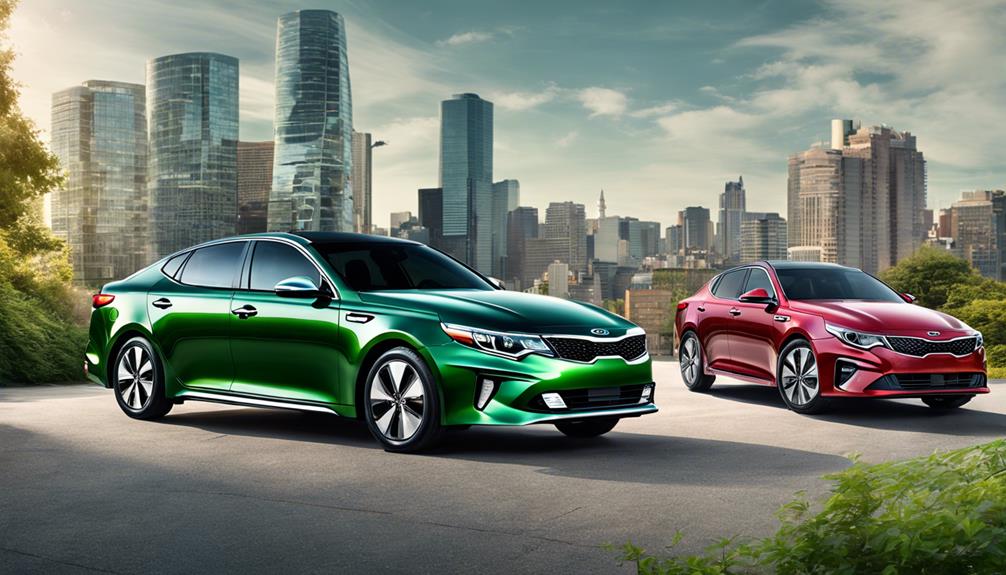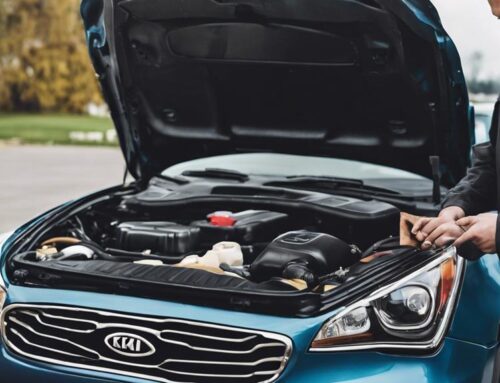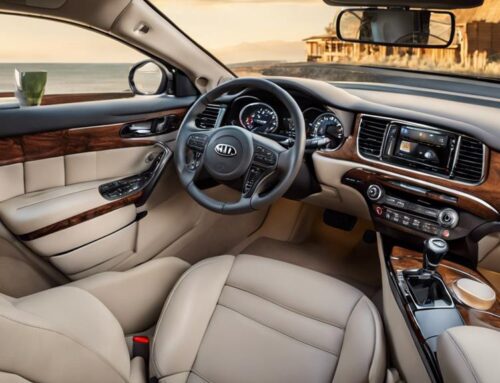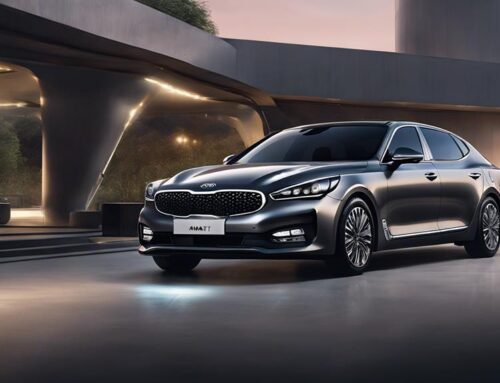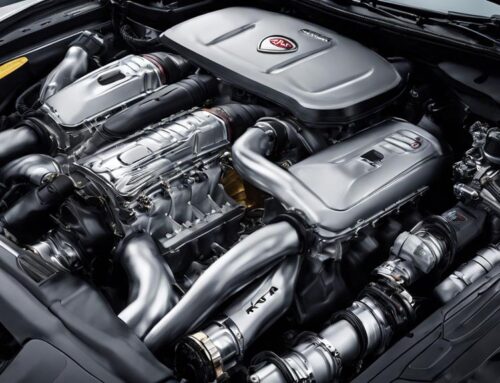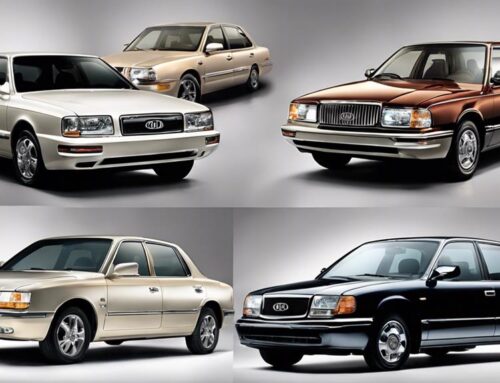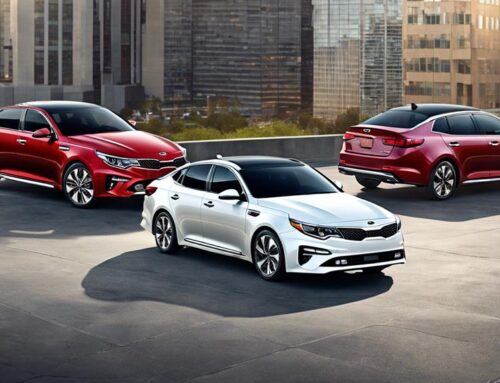When comparing the Kia Optima Hybrid to gasoline models, you'll find distinct pros and cons. The hybrid excels in fuel efficiency, achieving over 40 MPG, while gasoline models offer a traditional performance-driven experience at around 25-30 MPG. Hybrids typically have lower emissions, which benefits the environment and may lead to cost savings at the pump. However, they have higher upfront costs and potential battery replacement expenses. If you prioritize eco-friendliness, the hybrid's features might appeal to you, but if performance is your goal, the gasoline model could be a better fit. Explore further to weigh your options.
Key Takeaways
- The Kia Optima Hybrid offers superior fuel efficiency, achieving up to 40 MPG, compared to gasoline models at 25-30 MPG.
- Hybrids typically have lower emissions, contributing to better air quality and a reduced carbon footprint than gasoline variants.
- Initial costs for hybrid models may be higher, but long-term savings on fuel and potential tax incentives can offset this.
- The driving experience of the Kia Optima Hybrid includes smooth transitions and instant torque, while gasoline models focus on performance-oriented dynamics.
- Consumer preference varies; hybrids appeal to eco-conscious drivers, while gasoline models cater to those prioritizing traditional performance and refueling convenience.
Overview of Kia Optima Models
The Kia Optima lineup offers a range of models designed to cater to diverse driving preferences, blending style, efficiency, and performance.
If you're considering the Kia Optima Hybrid, you'll appreciate its eco-friendly design that doesn't compromise on comfort or features. The hybrid system provides a smooth driving experience while contributing to lower emissions, making it a responsible choice for those who prioritize sustainability.
On the other hand, when you compare the Kia Optima vs gasoline models, you'll find that the gasoline variants offer a more traditional driving feel, with powerful engine options and spirited performance.
While both models excel in their own right, the choice ultimately depends on your lifestyle and driving needs.
Fuel efficiency is a key factor for many drivers, and the Kia Optima Hybrid stands out in this area, delivering impressive miles per gallon.
However, the gasoline models also provide respectable fuel efficiency, making them suitable for various driving conditions.
Whether you're looking to serve the environment with the hybrid or enjoy the dynamic response of the gasoline version, the Kia Optima lineup has something for everyone, ensuring you make a choice that aligns with your values and needs.
Fuel Efficiency Comparison
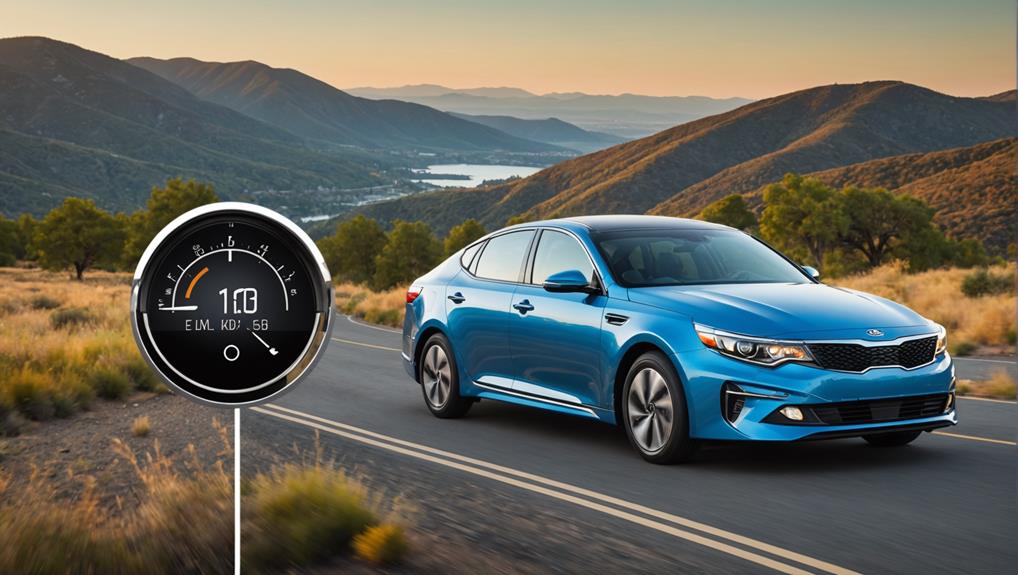
When it comes to fuel efficiency, the Kia Optima Hybrid clearly outshines its gasoline counterparts. You'll appreciate how the hybrid model combines a gasoline engine with an electric motor, leading to impressive miles per gallon (MPG) ratings.
While the gasoline Optima typically delivers around 25-30 MPG, the hybrid can achieve up to 40 MPG or more, making it a smart choice for anyone looking to save money at the pump.
Choosing the hybrid means you're also making a positive impact on the environment. The Kia Optima environmental impact is markedly lower than that of its gasoline models, as it produces fewer emissions and relies less on fossil fuels.
This not only benefits your wallet but also contributes to a healthier planet for future generations.
In a world where every drop counts, the hybrid vs gasoline Kia Optima debate leans heavily in favor of the hybrid when you consider fuel efficiency.
If you're committed to serving others and protecting the environment, the Kia Optima Hybrid is certainly the way to go. You'll drive smarter, save more, and help create a sustainable future.
Performance and Driving Experience
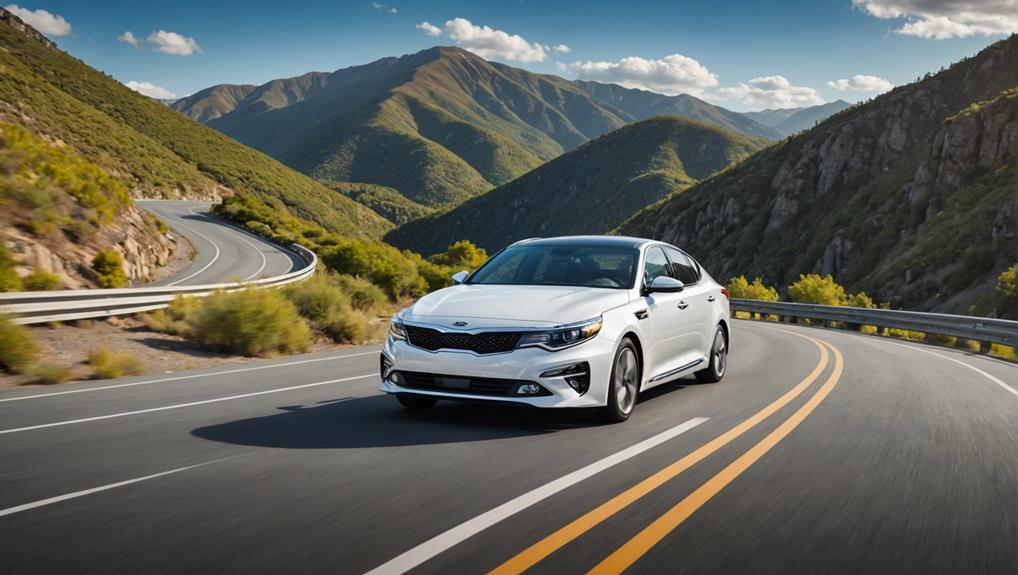
Experiencing the performance of the Kia Optima Hybrid reveals a smooth and responsive drive that rivals its gasoline models. You'll notice the seamless shift between electric and gasoline power, providing an efficient yet powerful driving experience. The hybrid's electric motor kicks in during low-speed situations, giving you instant torque for quick acceleration without the noise associated with traditional engines.
While the gasoline models offer spirited performance, the hybrid doesn't fall short. You'll appreciate the refined handling and comfortable ride, which makes it ideal for both city commutes and longer journeys.
The regenerative braking system enhances efficiency while also providing solid stopping power, ensuring that you feel in control at all times.
You might find the cabin quiet and well-insulated from road noise, allowing for a more enjoyable ride for you and your passengers. The steering feels responsive, giving you confidence in tight turns and during highway merging.
Cost of Ownership Analysis
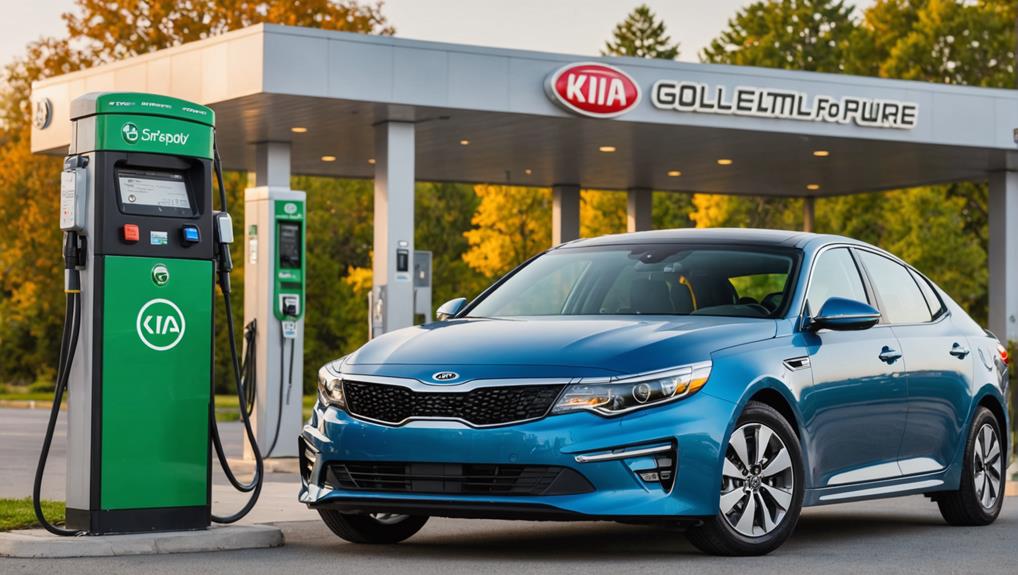
Choosing between the Kia Optima Hybrid and its gasoline counterparts isn't just about performance; it also involves considering the cost of ownership.
When examining these vehicles, you'll find that the hybrid generally offers lower fuel costs due to its impressive fuel efficiency. You'll spend less at the pump, which can greatly reduce your monthly budget, especially if you drive frequently.
Insurance costs are another factor. Hybrid models can sometimes carry lower premiums, thanks to their advanced safety features and reputation for reliability. Additionally, many regions offer tax incentives or rebates for hybrid vehicles, further easing your financial burden.
However, keep in mind that hybrids may have a higher upfront cost compared to gasoline models. While this can be an initial hurdle, the long-term savings on fuel and maintenance often outweigh that initial investment.
Maintenance costs for hybrids can vary, particularly if battery replacement becomes necessary.
Ultimately, by carefully examining these factors, you can make an informed choice that aligns with your financial situation and your commitment to serving others through responsible vehicle ownership.
Environmental Impact Assessment
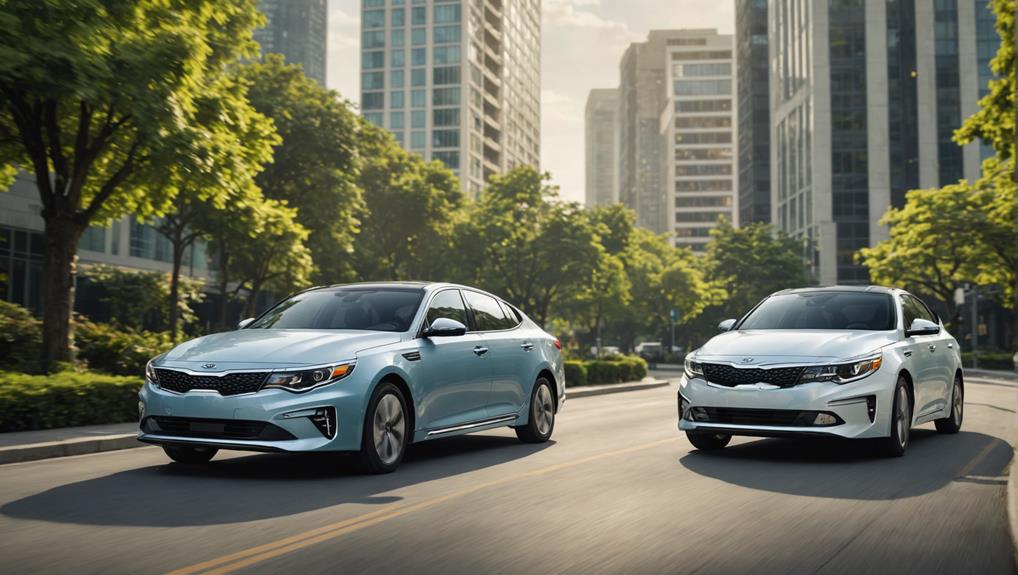
When you consider the Kia Optima Hybrid versus its gasoline counterparts, it's essential to look at emissions and fuel efficiency.
You'll find that hybrids often produce fewer harmful emissions while delivering better fuel economy.
Additionally, think about the sustainability of the resources used in each model, as this can impact the environment in the long run.
Emissions Comparison
In the ongoing battle between hybrid and gasoline vehicles, emissions stand out as a critical factor influencing your choice. The environmental impact of your vehicle can affect not just your community but the planet as a whole. By comparing the emissions of the Kia Optima Hybrid with its gasoline counterparts, you can make a more informed decision that aligns with your values.
Here's a quick comparison:
| Vehicle Type | CO2 Emissions (g/km) | NOx Emissions (g/km) |
|---|---|---|
| Kia Optima Hybrid | 104 | 0.05 |
| Kia Optima Gasoline | 147 | 0.1 |
| Competitor Hybrid | 95 | 0.06 |
| Competitor Gasoline | 155 | 0.12 |
As you can see, the Kia Optima Hybrid produces considerably lower CO2 emissions compared to gasoline models. This means you're contributing less to air pollution, helping to protect the environment for future generations. Choosing a hybrid not only benefits you but also serves the community by reducing harmful emissions. By making a responsible choice, you're taking a step towards a cleaner, healthier planet.
Fuel Efficiency Benefits
Many drivers find that the fuel efficiency of the Kia Optima Hybrid offers impressive benefits, not just for their wallets but also for the environment.
By choosing this hybrid model, you're making a powerful statement about sustainability and your commitment to a cleaner planet. The Optima Hybrid's impressive miles-per-gallon ratings help reduce the carbon footprint associated with driving, which can lead to significant positive impacts on the environment.
Here are some key benefits of its fuel efficiency:
- Lower greenhouse gas emissions: Contribute to a healthier atmosphere.
- Reduced dependence on fossil fuels: Support the shift to renewable energy sources.
- Cost savings: Spend less on fuel, allowing you to allocate funds to other meaningful causes.
- Enhanced air quality: Help improve the air we all breathe, benefiting community health.
- Encouragement for innovation: Support the automotive industry's move towards more sustainable technologies.
Resource Sustainability Considerations
Considering resource sustainability is essential for understanding the overall environmental impact of the Kia Optima Hybrid compared to its gasoline counterparts. By evaluating resource use and emissions, you can make a more informed choice that benefits both your community and the planet.
Here's a quick comparison of the key environmental factors:
| Feature | Kia Optima Hybrid | Gasoline Models |
|---|---|---|
| Fuel Source | Electricity & Gasoline | Gasoline Only |
| CO2 Emissions | Lower | Higher |
| Material Sourcing | Sustainable practices | Conventional sourcing |
The Kia Optima Hybrid's dual fuel source means it relies less on fossil fuels, which helps reduce greenhouse gas emissions. By choosing hybrid technology, you're contributing to a cleaner environment and supporting a shift towards renewable energy. Additionally, the materials used in the hybrid model often follow more sustainable sourcing practices, minimizing the overall ecological footprint.
Features and Technology Differences
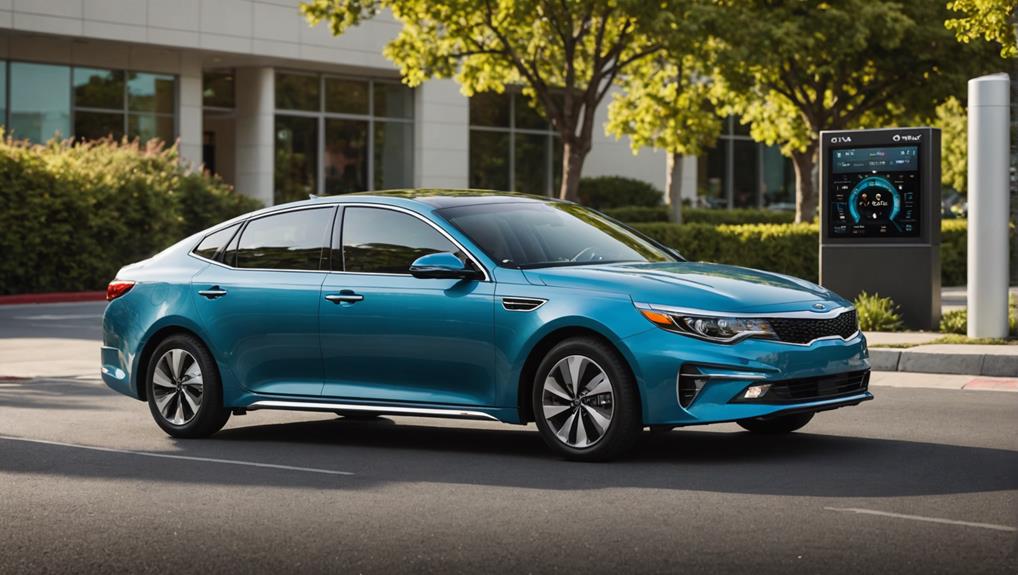
When you plunge into the features and technology of the Kia Optima Hybrid versus its gasoline counterparts, you'll notice key distinctions that cater to different driving preferences.
The hybrid model emphasizes eco-friendliness and efficiency, while the gasoline versions focus more on performance and driving dynamics.
Here's what you can expect from each:
- Fuel Efficiency: The hybrid excels in miles per gallon, making it ideal for those who prioritize saving on fuel costs.
- Regenerative Braking: This feature in the hybrid captures energy during braking, enhancing efficiency and extending battery life.
- Advanced Driver Assistance Systems: Both models boast technologies like lane-keeping assist and adaptive cruise control, but the hybrid often includes more eco-focused features.
- Infotainment Options: The hybrid tends to offer more tech-oriented features, like energy consumption displays, to help you optimize driving habits.
- Charging Capabilities: While the hybrid has plug-in options, the gasoline models focus solely on traditional refueling.
Ultimately, your choice will depend on whether you value sustainability or performance more in your driving experience.
Each model serves distinct needs that can enrich your journey.
Frequently Asked Questions
What Are the Warranty Differences Between Hybrid and Gasoline Models?
When you're considering warranty differences between hybrid and gasoline models, you'll find that hybrids often come with extended coverage on their battery systems.
Typically, you can expect a longer warranty for the hybrid components, sometimes up to 10 years or 100,000 miles, compared to standard coverage for gasoline models.
It's essential to review the specific terms, as they vary by manufacturer, ensuring you choose the best option for your needs.
How Does Maintenance Differ for the Hybrid Compared to Gasoline Models?
When you think about maintenance, which would you choose: fewer trips to the mechanic or more?
With hybrids, you'll generally deal with less wear on brakes thanks to regenerative braking, which can lower maintenance costs.
However, they often require specialized knowledge for servicing, especially their batteries.
Gasoline models, while simpler, may need more frequent oil changes and exhaust system checks.
Ultimately, your choice will shape your long-term maintenance experience.
Can I Use Regular Gasoline in the Hybrid Model?
You can't use regular gasoline in the hybrid model; it requires a specific blend designed for hybrids.
Using the wrong fuel could affect performance and efficiency, which isn't what you want. It's best to stick with the manufacturer's recommendations.
By doing so, you'll guarantee the engine runs smoothly and you're helping the environment, too.
Maintaining the right fuel choice contributes to better performance and longevity for the vehicle.
Are There Any Tax Incentives for Purchasing the Kia Optima Hybrid?
If you're eyeing the Kia Optima Hybrid like a treasure chest of savings, you're in luck!
Many states offer tax incentives to encourage eco-friendly purchases. These incentives can include federal tax credits, state rebates, or even reduced registration fees.
It's a win-win for you and the environment. Before you plunge in, check your local regulations to maximize your benefits and guarantee you're making a wise investment for both your wallet and the planet.
What Are the Resale Values for Hybrid Versus Gasoline Models?
When you consider resale values, hybrids often hold their value better than gasoline models. Buyers appreciate the fuel efficiency and eco-friendliness that hybrids offer, which can make them more desirable in the used car market.
However, some gasoline models also maintain strong resale values due to reliability and brand reputation. Ultimately, your choice will depend on factors like demand in your area and the vehicle's overall condition.
Conclusion
In choosing between the Kia Optima hybrid and gasoline models, you're weighing fuel efficiency against performance, cost against environmental impact, and features against driving experience. If you value eco-friendliness and savings, the hybrid shines. If you crave power and traditional driving feel, the gasoline model stands out. Ultimately, it's about your priorities and lifestyle. So, consider what matters most to you, and drive away with the model that fits your needs best.

